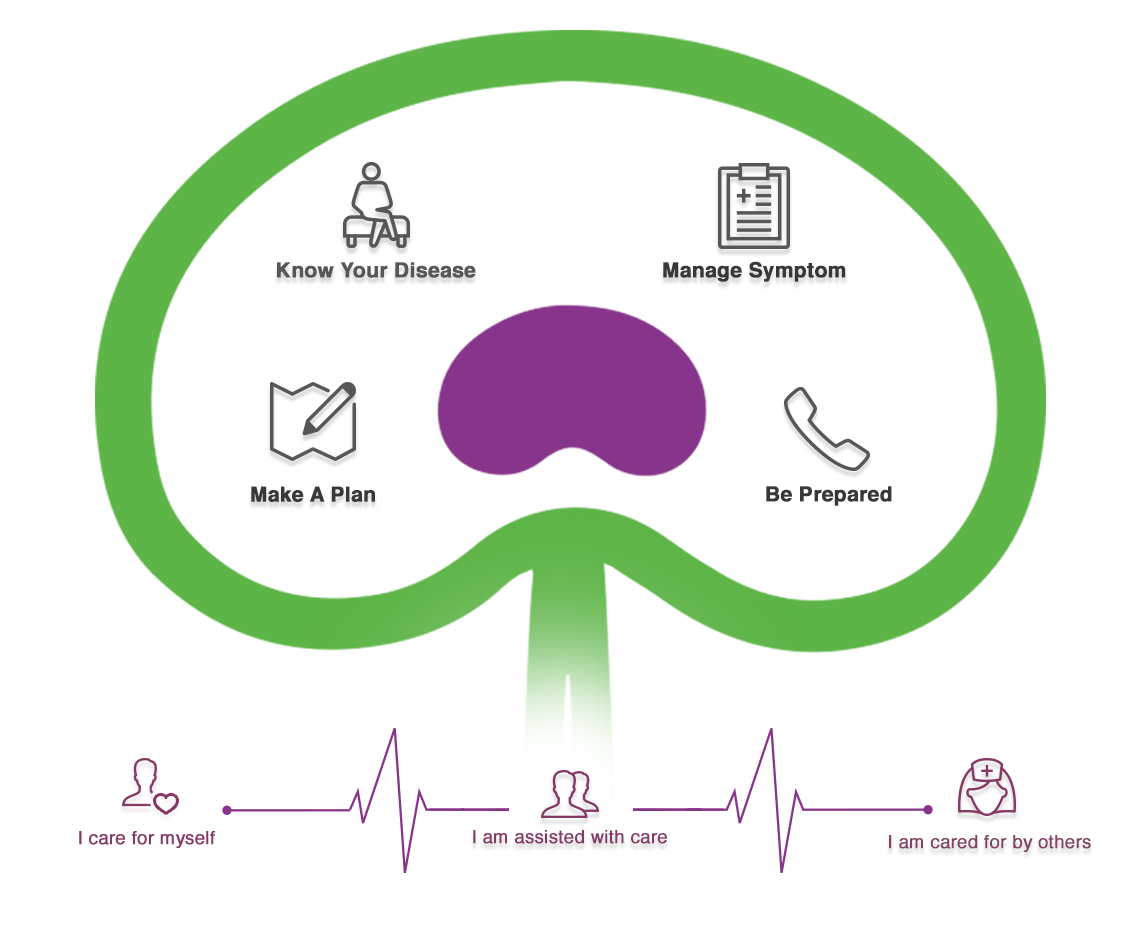About
The Conservative Kidney Management project involves stakeholders across Alberta including nephrologists, primary care providers, nursing and allied healthcare professionals, patients and families. It is a collaborative effort led by the Kidney Supportive Care Research Group that involves the Kidney Health Strategic Clinical Network TM of Alberta Health Services, Alberta Kidney Care, and Alberta Innovates.
Our provincial committee regularly reviews the evidence and will continue updating the Clinical Pathway to reflect the best clinical evidence. All of the clinical guidelines were circulated widely within nephrology, palliative care, community care, and primary care. In addition, they were also circulated to other stakeholders including EMS, respiratory therapy, and patients/family members.
To learn more about the pathway or to provide your feedback, please email the CKM team.
This pathway represents the best clinical evidence arrived at after careful consideration and does not override the individual responsibility to make decisions appropriate for each patient.
The guidelines were developed after comprehensive searches of the literature were conducted. Electronic databases include MEDLINE, CINAHL, UptoDate, the Cochrane Library, and Dynamed. Searches for other guidelines in nephrology and palliative care programs were also undertaken. Searches were conducted on a topic by topic basis with assistance from AHS Knowledge Management: Library Services. Results also incorporated prior literature searches done as part of Dr. Sara Davison’s research. Search terms included “Conservative Kidney Management”, “Conservative Kidney Care”, “End Stage Chronic Kidney Disease”, “Supportive Kidney Care”, “Kidney Palliative Care” and the topic in question, eg. “Dyspnea”.
All articles considered were prioritized depending on the strength of evidence. For example, Level I evidence (such as an RCT) would be included before Level IV evidence (such as another clinical practice guideline). An example of this is the inclusion of pramoxine, doxepin, and gabapentin for pruritus (Young, 2004; Pour-Reza-Gholi, 2007; Gunal, 2004) instead of sedating antihistamines as recommended in other guidelines (with no studies confirming their efficacy).
For many topics, there is very limited (if any) Level I - III evidence specific for conservatively managed ESKD patients. In this regard, then, articles were considered from the general CKD literature, at times including dialysis, geriatrics, and palliative care literature. Based on consensus-building in the provincial working group, recommendations were made taking the following into consideration: safety and symptom management, the patient’s GFR or overall condition, appropriate dose adjustments for kidney clearance, specific access to medications in Alberta, and so forth. Where there was discrepancy in terms of a particular dose or medication, the recommendation would err on the conservative side.
The symptom management guidelines all proceed from the least invasive/lowest risk interventions to the more invasive/higher risk interventions (eg. non-pharmcological interventions, then topical therapies, then systemic therapies). Dose adjustments and side effects are mentioned when significant. The CKD Management Guidelines are all prefaced with a “Guiding Principles” section that outlines the above considerations and encourages discussion.
CKM Pathway References - last updated Aug 2016
Communicating treatment options about dialysis or conservative kidney management to patients can be challenging for both healthcare providers and patients / families. To help patients decide which treatment option to pursue, a Patient Decision Aid (PDA) was launched April 2017 for testing and evaluation. PDAs provide a structured, evidence-based platform for staff to engage patients/families in these difficult conversations. PDAs have been shown to improve patient’s knowledge regarding treatment options, reduce their decisional conflict related to feeling uninformed and unclear about their personal values, enables them to take a more active role in decision-making and improves congruence between the chosen option and their values.
Acknowledgements:
The CKM Project Team would like to acknowledge the following groups for allowing us to adapt their tools for the development of this Patient Decision Aid:
ShERPa-DM2 decision aid developed by Dr. Janet Davis, Dr. Janice Bissonnette, Dr. Mary Ann Murray, and the Multi Care Kidney Clinic team at The Ottawa Hospital.
The 6 month mortality risk calculations for dialysis patients developed by researchers at the Medical Technology and Practice Patterns Institute in collaboration with researchers at the University of California - Davis.
The CKM Care Pathway will be piloted in Northern and Central Alberta starting in Sept 2016 targeting outpatient kidney clinics. Although it is in the pilot phase, the pathway will be made available to the general public at that time and we are planning out the next phases of implementation which will include Southern Alberta as well as practitioners in other care settings such as Community Care. Please see our Events & Newsletters page for more information.
The pilot implementation will evaluate criteria across the 6 Dimensions of Quality and include, but are not limited to:
| Quality Dimension | Key Performance Indicators (KPIs) |
|---|---|
| Appropriateness |
|
| Acceptability |
|
| Effectiveness |
|
| Accessibility |
|
| Safety |
|
| Efficiency |
|



